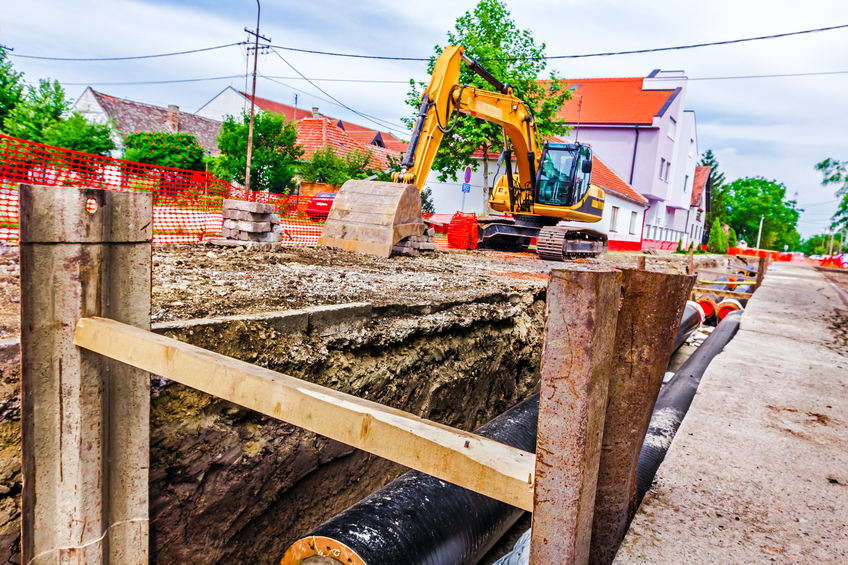Delaware Geotechnical and Ethics 24 PDH Discount Package 1
Selecting and Accommodating Inflow Design Floods for Dams (C04-055)
Slope Stability (G04-001)
Tunnel Operations, Maintenance, Inspection, and Evaluation Manual: Maintenance (C02-074)
Trenching and Excavation Safety (C02-072)
Engineering Ethics for Delaware Professional Engineers (DE2-001)

This online engineering PDH course presents the guidelines for calculation of the bearing capacity of soil under shallow and deep foundations supporting various types of structures such as buildings and houses, towers and storage tanks, fills, embankments and dams. These guidelines may be helpful in determining soils that will lead to bearing capacity failure or excessive settlements for given foundations and loads.
Bearing capacity is the ability of soil to safely carry the pressure placed on the soil from any engineered structure without undergoing a shear failure with accompanying large settlements. Applying a bearing pressure which is safe with respect to failure does not ensure that settlement of the foundation will be within acceptable limits. Therefore, settlement analysis should generally be performed since most structures are sensitive to excessive settlement.
This 10 PDH online course is applicable to civil, structural and geotechnical engineers, as well as design and construction personnel who are involved with foundation investigation and design.
This PE continuing education course is intended to provide you with the following specific knowledge and skills:
- Understanding the failure modes and other factors that influence the bearing capacity
- Knowing the non-load related design considerations due to environmental and geotechnical conditions
- Familiarizing with the laboratory and in situ methods of determining soil parameters required for analysis of bearing capacity
- Analyzing the bearing capacity of shallow and deep foundations
In this professional engineering CEU course, you need to review the US Corps of Engineers Publication EM 1110-1-1905, "Bearing Capacity of Soils".
Upon successful completion of the quiz, print your Certificate of Completion instantly. (Note: if you are paying by check or money order, you will be able to print it after we receive your payment.) For your convenience, we will also email it to you. Please note that you can log in to your account at any time to access and print your Certificate of Completion.

This online engineering PDH provides basic guidelines for selecting and accommodating inflow design floods for dams based on current and accepted practices.
Appropriate selection of the Inflow Design Flood is the first step in evaluating and designing a dam to address hydrologic potential failure modes and reduce risks to the public. Existing guidelines of most state and federal agencies for evaluating the hydrologic safety of dams were written in the late 1970s. Since that time, significant technological and analytical advances have led to better watershed and rainfall information, improvements in the analysis of extreme floods, greater sophistication in means to quantify incremental dam failure consequences, and tools for evaluating hydrologic events in a risk-based context.
This 4 PDH online course is applicable to geotechnical and civil engineers, dam owners or regulators, and other technical personnel interested in gaining a better knowledge on inflow design floods for dams.
This PE continuing education course is intended to provide you with the following specific knowledge and skills:
- Learning about the dam classification system
- Understanding the guidelines for selecting the inflow design flood
- Learning about spillway characteristics (mainly controlled versus uncontrolled)
- Familiarizing with routing the inflow design flood
- Familiarizing with freeboard requirements
- Defining terminology and acronyms associated with the overall scope of the course
Upon successful completion of the quiz, print your Certificate of Completion instantly. (Note: if you are paying by check or money order, you will be able to print it after we receive your payment.) For your convenience, we will also email it to you. Please note that you can log in to your account at any time to access and print your Certificate of Completion.

This online engineering PDH course provides guidance for analyzing the static stability of slopes of earth and rock-fill dams, slopes of other types of embankments, excavated slopes, and natural slopes in soil and soft rock.
Slope stability criteria are presented for strength tests, analysis conditions, and factors of safety. The criteria are intended to be used with methods of stability analysis that satisfy all conditions of equilibrium. Methods that do not satisfy all conditions of equilibrium may involve significant inaccuracies and should be used only under the restricted conditions described herein.
This 4 PDH online course is applicable to geotechnical and structural engineers, as well as design and construction personnel working on projects involving slope stability analysis.
This PE continuing education course is intended to provide you with the following specific knowledge and skills:
- Aspects applicable to all load conditions
- Analyses of stability during and at the end of construction
- Analyses of steady-state seepage conditions
- Analyses of sudden drawdown stability
- Analysis of stability during earthquakes
- Design criteria for existing and new embankments
- Design criteria of other slopes
- Presentation of various types of analysis and results
In this professional engineering CEU course, you need to review Chapters 1 through 4 of the US Corps of Engineers Publication EM 1110-2-1902, "Slope Stability".
Upon successful completion of the quiz, print your Certificate of Completion instantly. (Note: if you are paying by check or money order, you will be able to print it after we receive your payment.) For your convenience, we will also email it to you. Please note that you can log in to your account at any time to access and print your Certificate of Completion.

This engineering online PDH course will provide an overview on effective maintenance considerations of tunnel systems and the associated components.
An effective maintenance program helps reduce costs, decrease the number of tunnel closures, increase public safety, and ensure adequate levels of service. To maximize efficient use of resources and minimize costs, maintenance programs should be optimized. When large-scale repairs and upgrades are implemented, these projects are typically referred to as tunnel rehabilitation.
This 2 PDH online course is applicable to civil and structural engineers, as well as design and construction personnel involved with the maintenance process of tunnel systems.
This PE continuing education course is intended to provide you with the following specific knowledge and skills:
- Understanding the fundamental causes of deterioration and corrosion in tunnels.
- Familiarization with the methods aimed at controlling groundwater seepage.
- Familiarization with the repair techniques and rehabilitation schemes.
Upon successful completion of the quiz, print your Certificate of Completion instantly. (Note: if you are paying by check or money order, you will be able to print it after we receive your payment.) For your convenience, we will also email it to you. Please note that you can log in to your account at any time to access and print your Certificate of Completion.

This online engineering PDH course provides guidance on the requirements for excavation and trenching operations. This course describes safe work practices that can protect workers from cave-ins and other hazards.
Trenching and excavation work presents serious hazards to all workers involved. Cave-ins pose the greatest risk and are more likely than some other excavation-related incidents to result in worker fatalities. One cubic yard of soil can weigh as much as a car. An unprotected trench can be an early grave. Employers must ensure that workers enter trenches only after adequate protections are in place to address cave-in hazards. Other potential hazards associated with trenching work include falling loads, hazardous atmospheres and hazards from mobile equipment. Following the requirements of OSHA Excavation standards will prevent or greatly reduce the risk of cave-ins and other excavation-related incidents.
This 2 PDH online course is intended for employers/business owners, engineers, managers, construction workers and any other personnel working on construction projects involving trenching and excavation safety.
This PE continuing education course is intended to provide you with the following specific knowledge and skills:
- Understanding the different risks and dangers of trenching and excavation operations
- Understanding the OSHA Excavation standards and how they protect workers
- Pre-planning excavation work
- Learning the basics of protective systems
Upon successful completion of the quiz, print your Certificate of Completion instantly. (Note: if you are paying by check or money order, you will be able to print it after we receive your payment.) For your convenience, we will also email it to you. Please note that you can log in to your account at any time to access and print your Certificate of Completion.

This online engineering PDH course presents the laws of professional responsibility governing the practice of engineering in the State of Delaware, as well as the Delaware engineering code of ethics as follows:
- Delaware Professional Engineers' Act: Title 24, Chapter 28
- Delaware Engineering Code of Ethics
Engineering ethics is (1) the study of moral issues and decisions confronting individuals and organizations involved in engineering and (2) the study of related questions about moral conduct, character, ideals and relationships of peoples and organizations involved in technological development (Martin and Schinzinger, Ethics in Engineering).
This 2 PDH online course is applicable to Professional Engineers licensed in the State of Delaware and who are required to demonstrate continuing professional competency in engineering ethics as a condition of their license renewal.
Every licensee is required to obtain the equivalent of 12 PDHs per year (or 24 PDHs obtained anytime during the renewal period). Of the 24 PDHs earned during the biennial renewal period: no less than 2 PDH and no more than 6 PDH shall be related to professional ethics, and no more than 9 PDH shall be related to business or project management. The balance shall be related to the licensee’s area of technical practice.
This PE continuing education course is intended to provide you with the following specific knowledge and skills:
- Understanding the statutory laws regulating the practice of engineering in the State of Delaware and their application to professional engineers
- Understanding the Delaware Engineering Code of Ethics promulgated by the Council of the DAPE to safeguard life, health and property and promote public welfare
- Learning about the engineering rules of professional responsibility and ethical conduct as well as understanding the basic obligations of the engineer
- Understanding the Delaware disciplinary process and the range of violations and corresponding penalties imposed by DAPE
Upon successful completion of the quiz, print your Certificate of Completion instantly. (Note: if you are paying by check or money order, you will be able to print it after we receive your payment.) For your convenience, we will also email it to you. Please note that you can log in to your account at any time to access and print your Certificate of Completion.